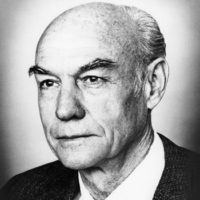
Roger Wolcott Sperry
California Institute of Technology
For contributions to the knowledge of brain function, and the understanding of mental and psychosomatic diseases.
Dr. Sperry discovered that during brain development, nerve cells form orderly interconnections. He established that these brain cells are selectively attracted to each other, as predetermined by heredity. He conceived the innate patterning to be primary for the emergence of man’s mental and self-awareness and capacity for thought, which are therefore not passive abstractions, but functional manifestations of human brain nerve tissue in action.
Furthermore, building upon earlier animal studies of the bisected brain, Dr. Sperry and his group discovered that in man there are two parallel streams of consciousness in the two separate brain halves, and that each of the two halves possesses special and distinctive methods of mental processing. The language-dominant hemisphere (usually the left one) has the ability, among other capacities, to translate thought and emotion into words; whereas the right hemisphere was shown to be dominant—for instance, in perceiving space relationships and in non-verbal reasoning and communication, such as music.
The traditional view had been that only one hemisphere of the brain was dominant, and that the other was a minor one, which lacked the capacity for higher brain function. This theory has been replaced by Dr. Sperry with the concept that either hemisphere may be dominant for higher mental function—according to circumstances—and that each hemisphere complements the other in these respects.
Dr. Sperry observed that in the normal brain these processes and functions of the two brain hemispheres are harmoniously merged and exchanged. If however, this harmonious merger does not take place, leaving a mind divided within itself, mental disorder may ensue.
To Dr. Sperry, a scientific giant who is the first to give scientific answers to age-old philosophical questions on the nature of man and his self-awareness, this 1979 Albert Lasker Basic Medical Research Award is given.
Roger Wolcott Sperry
Acceptance remarks, 1979 Lasker Awards Ceremony
The great pleasure and feeling in my right brain is more than my left brain can find words to describe. To fully convey my many thanks and indebtedness: to former colleagues, to Caltech, to the National Institutes for support and others involved would, in itself, take much more than our allotted time.
When it comes to prospects for future benefits and quality-of-life impact, our own bets, and hopes, have shifted somewhat in recent years from the more direct medical, scientific, and education implications, to give more focus to certain less direct, more humanistic—what may be called human-value implications of brain research. These stem largely from recent changes in our concepts regarding the mind of man, the nature of consciousness and the fundamental relation of mind to matter and to brain mechanism—concepts that bring some changes in worldview perspectives and revise our ultimate criteria for determining value priorities and settling value conflicts.
Promising prospects emerge particularly as these apply in those so-called world crisis areas where today’s major, and greatest, threats to the quality of life are found, and where differential outcomes in resolution of value conflicts have potential for tremendous global quality-of-life consequences. For example, even a slight shift in value perspectives affecting the balance in opposing views on the Abortion vs. Right-to-Life issue could mean the difference, in itself, of hundreds of millions of lives, pro or con, with enormous secondary impact also on current and future generations.
Considering the way the world is going these days and the prime role that human value factors play in determining the course of events, one cannot hope for more than that. Our basic mind-brain findings—so kindly and generously referred to in the citation—may serve somehow, perhaps, to contribute beneficially, at least in a small way, to that supreme determinant of the quality of life: man’s sense and understanding of ultimate value to help benefit the well-being of all people everywhere.
